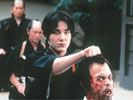Eye For Film >> Movies >> Gohatto (1999) Film Review
At the end of Japan's Shogunate era a young man, Kano, joins the Shinsen militia, a conservative samurai group, where his androgynous beauty proves a disruptive influence as both peers and officers vie for his attentions.
With the Japanese title Gohatto ("against the law") being translated in some territories as "Taboo," one expects this tale of repressed homosexual passions amongst Samurai to be somewhat more provocative, especially as the director is Nagasi Oshima, the one-time enfant terrible of Japanese cinema who loudly rejected Ozu and Mizoguchi for Godard.

As it turns out, however, it's not clear what is especially taboo about the film's content, nor how Oshima's style differs from those of from the old guard he once rejected.
The rules of the samurai group do not outlaw homosexuality - borrowing money is a capital offence - while the strongly homosocial nature of their culture almost seems at times to encourage men with "leanings that way," so long as their activities do not impact negatively on discipline and group cohesion. Certainly, it's not a homosexual take on In The Realm Of The Senses, nor Bruce LaBruce meets Yukio Mishima.
While Oshima's direction is cold and clinical by most filmmakers' standards, it's never quite formalised enough to self-consciously draw attention to itself and encourage an intellectualised response, the anachronistic use of intertitles and wipes aside. A comparison with In The Realm Of The Senses, where Oshima's utterly dispassionate mise-en-scene contrasted so effectively with the all-consuming passion of the two lovers, again shows the somewhat half-hearted nature of the piece.
The lack of involvement extends to the performances. Though toplined, Takeshi Kitano's role as Captain Hijikata is really a supporting one. He doesn't do anything much, letting the sheer impassiveness of his post-accident, half-paralysed face speak volumes. Elsewhere, Ryuhei Matsuda impresses as the androgynous Kano, though again the role is one that depends first and foremost on his looking right.
Gohatto is a beautiful film. The production design, lighting and cinematography combine to fill the screen with shots you want to freeze-frame and admire, while Ryuchi Sakamoto's glacial score adds a light frosting to the confection.
But this isn't enough given the film's failure to move the spectator, whether emotionally or erotically, or to engage adequately at an intellectual level.
Reviewed on: 14 Mar 2003





















